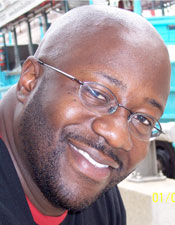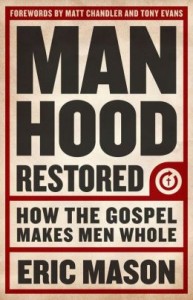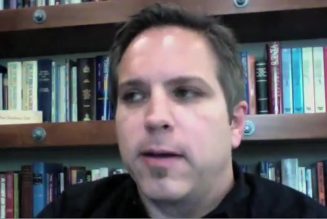 Eric Mason is the pastor of Epiphany Fellowship in Philadelphia and the author of Manhood Restored: How the Gospel Makes Men Whole
Eric Mason is the pastor of Epiphany Fellowship in Philadelphia and the author of Manhood Restored: How the Gospel Makes Men Whole, I first met Eric when he served on the advisory council for The Gospel Project. He’s a powerful preacher who loves his church, his family, and his community. Today, I’ve invited him to the blog for a discussion about God’s vision of manhood.
Trevin Wax: Men’s movements have been a permanent fixture in the evangelical landscape for the past two decades. Why?
Eric Mason: The absence of men in churches. Even where there are men present in local churches, there seems to be a passivity of presence.
In light of the absence of leadership, there has been everything from Promise Keepers to some of the new manhood movements – Dr. Evans’ Kingdom Man, the whole Men’s Fraternity, etc. This is a phenomenal need and each variation has added its own flair to it. Kostenberger’s God, Marriage, and Family deals with the family as a whole with a special emphasis on the theology of family and the life of men. I think is the best book on men written in the last twenty years. I also can’t leave out Family Life and their contribution. Everywhere I hear the similar issues from the past generations, and these issues have given rise to these movements.
Trevin Wax: What do you think is missing from some of the strategies and principles coming out of the men’s movement?
Eric Mason: At times, we’ve needed to see more vulnerability from leaders. When we are honest about our failures, we help others understand the gospel more effectively. When we are honest about our failures, we can believe God and repent of our sins and turn toward Him because He is faithful. I am not talking about any of the men I’ve mentioned in particular. All of us tend toward moralistic teaching how-tos – how to do this, how to do that, how to be a better husband, how to be a better wife, and while those things have their place, we need a theological framework that sets that up.
I think on the other end we’ve had highly theological works that left men in a daze. We have this beastly theological grid, and especially for some of the younger generations that love intellectualism and robust theology, they’re at a loss with how to apply all their theological terminology. There can be a struggle to live it out.
There needs to be a little more realness. In that realness there needs to be a connection and an intersection between theological richness and cultural connectivity to the reality and progression of culture. I’m not dogging any of the movements that I’ve mentioned; I’m just speaking in general.
 Trevin Wax: You write about the impact of daddy deprivation. What do you mean by this and why is it so important?
Trevin Wax: You write about the impact of daddy deprivation. What do you mean by this and why is it so important?
Eric Mason: Daddy deprivation was a term I got from a pastor named Blake Wilson in Houston about 13 years ago. That phraseology of daddy deprivation was phenomenal to me and I wanted to flesh it out because as time went on, and I began to see an epidemic of fatherlessness.
In the book Fatherless America, David Blankenhorn talks about the category of fatherlessness. Fatherlessness can go all the way from a guy who’s home, he has his family, he works, he provides but he is emotionally, intellectually absent. That’s fatherlessness because there is no active ministry of presence. But then all the way up to the person who abandons their children or had sex with a woman and kind of rolled out on her and the kids never knew who their dad was and they grew up without a father.
Daddy deprivation is anything between from those extreme pendulums. The reason I talk about the importance of this is because as a pastor have seen and experienced the impact of daddy deprivation on the lives of men cross-ethnically.
In our own church, Epiphany Fellowship, we’ve got white men, Asian men, Latino men, black men, different types of African, Caribbean, men, people from overseas. I hear many stories from different people about the formation of family. Daddy deprivation is a consistent issue in biblical manhood that needs to be engaged. It’s systemic because fathers were given the theological and spiritual responsibility to lead. In Proverbs, we see the leading of the family along with a mother who is an instructor as well, but the husband takes the visionary leadership in instructing the family.
The gospel restores fatherhood by God giving Himself back to us through the restoring work of Jesus Christ. I’m in a neighborhood where there is a 90 percent single parent home rate. So I feel it a lot more overtly than most.
Trevin Wax: You talk about the need for discipleship to include the cultivation of a biblical worldview. What are some of the ways we can prioritize the renewing of the mind as well as the spirit?
Eric Mason: Good question. I teach a great deal on discipleship and I didn’t put it all in this book because I’m going to work on another book that will include a full body ministry of discipleship.
Still, I was fascinated by how much the Bible talks about the mind being renewed. Ephesians 4:23 talks about being renewed in the spirit of your mind. 1 Corinthians 2 – the last few verses – talk about having the mind of Christ. Romans 12: 1-2 talks about it. And even in the Old Testament in Ezekiel 30:25-27 you look at how the gospel restores our heart and in restoring our heart, we get a new mind.
How do we cultivate the new mind? Forming the mind of Christ with the Word of God through discipleship. That means discipleship is just not one on one; it’s everything that is provided through the local church to the people of God, and that means every aspect of equipping – from the pulpit to small groups to going on mission trips to men’s time – all those things play a role in discipling. One of the main formats of discipleship in the New Testament are the “one anothers.”
Jesus says that in order to be a disciple you have to deny yourself. That means denying your preferences and embracing God’s way of doing things based on the Word of God. So how do we prioritize things? Deny self, pick up the cross daily and follow Him in ways that create in us a greater sense of a transformation of our way of thinking into His way of thinking.
Trevin Wax: You devote a section of your book to restored sexuality. What are the particular temptations we are facing today and how does the gospel aid us in our fight against sexual sin?
Eric Mason: Men believe lies that go back to worldview and strongholds. I have a message on strongholds out of Judges 6 that defines strongholds as things that assert themselves against the knowledge of God (2 Corinthians 10). This belief that the enemy has a better handle on sexuality than God causes us to give ourselves over to fallen forms of sex because we don’t believe God has our good in mind even though He created the whole thing. That’s why in 1 Corinthians, Paul utilizes the gospel as the means by which we’re motivated to have sanctified sex and move away from illicit forms. In the book, I talk in detail about some practical ways to embrace a gospel centered worldview as it relates to sex, because I think everything is a belief issue.
Check out the first chapter of the book by clicking here: Manhood Restored Pastor Eric Mason Chapter 1
Trevin Wax is the Managing Editor of The Gospel Project, a curriculum developed by LifeWay Christian Resources. He blogs daily at Kingdom People. He is also the author of Holy Subversion (Crossway, 2010) and Counterfeit Gospels (Moody, 2011).










